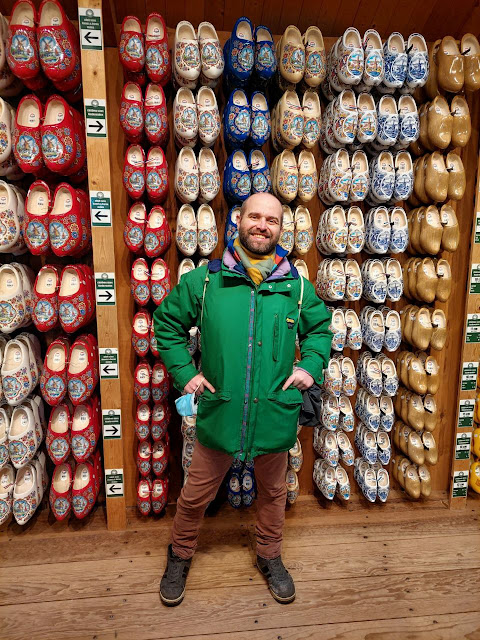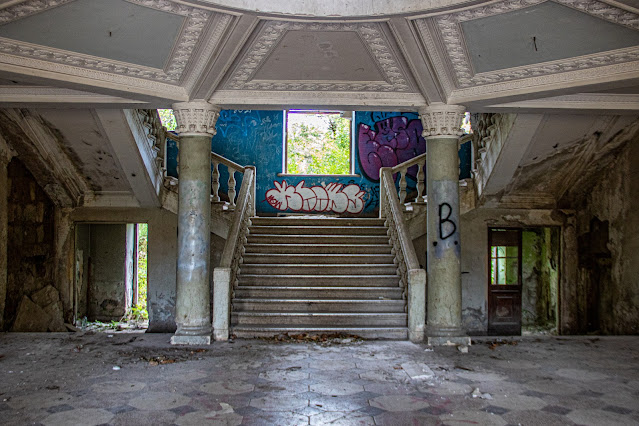Nara
In Autumn 2019 I travelled for one month in Japan, I
volunteered for two weeks in a village in Kyushu island and for the other two, I visited the most famous cities in the country.
Nara is a small village close to
Osaka, and not far from Kyoto. It's famous because there are free deers, they are sacred animals there, and for its temples.
I've been there just half a day, and it could be enough if you don't have more time, but I could have stayed more because it's an amazing village, with a lot of opportunities to take nice pictures and have nice memories.
Kofukuji
Nan'endō
This is the first temple on the way from the railway station to the city centre. In the picture, there is the south octagonal hall, an important cultural property.
This building is site n 9 of the Saigoku Kannon Pilgrimage, which is a pilgrimage of 33 Buddhist temples throughout the Kansai region. It is traditional for pilgrims to wear white clothing, conical straw hats and to carry walking sticks.
Gojū-no-tō
The temple has many buildings, in the picture the five-storied pagoda; I never get tired of these pagodas, there are a lot of them in Japan, almost every temple has one, but I always liked them, it's something unusual to see as a European. I have another picture of this pagoda, with a man sitting near to it drawing, but I preferred this one because of the sky and the clouds, it's like the pagoda is launched to the sky.
Tō-kondō
Another part of the temple is the ester golden hall; Kofukuji temple was once one of the powerful Seven Great Temples in the city of Nara.
Kofukuji has its origin in 669 by Kagami-no-Ōkimi, the wife of Fujiwara no Kamatari, wishing for her husband’s recovery from illness.
The temple was damaged and destroyed by civil wars and fires many times, a lot of temples in Japan have the same background, and rebuilt as many times as well, but some buildings or part of them were never reconstructed and are missing today.
Chū-kondō
This is the central golden hall, it was reconstructed in 2018, the building now serves as a temporary lecture hall. At the time I was there most probably the reconstruction wasn't finished, and it wasn't possible to go closer than the woman in the pictures, or, if I remember well, the woman was already too close because it was not possible to go inside the fence at all.
Todaiji
Eastern great temple
Also, this temple was part of the powerful Seven Great Temples in the city of Nara, it is also listed as UNESCO World Heritage Site as one of the "Historic Monuments of Ancient Nara".
This temple for me is amazing, I was stunned when I saw it, it is really big and it is surrounded by gardens so the first impact it is intense.
While I was in front of it enjoying the view some students approached me reading from a paper some questions in English: where are you from?, how old are you?, which is your favourite Japanese food? they were doing, most probably, a school assignment and at the end, we had a picture together.
The great Buddha
The temple is famous for the Great Buddha Hall (Daibutsuden), houses the world's largest bronze statue of the Buddha, known in Japanese as Daibutsu.
I didn't know about the Buddha before reaching the temple and buying the entrance ticket, so I was really surprised when I entered, it's impressive, it is 15 m (49 ft) tall, it was built in the 752 and it is part of the UNESCO World Heritage site Historic Monuments of Ancient Nara and National Treasure as the temple itself.
Nara Park
Future
Nara Park was established in 1880 and it is one of the oldest parks in Japan, over 1200 sika deer are freely roaming there. These animals were considered divine and sacred, for example till 1637 killing one of them was punishable by death, after WWII the deer were officially classified as a natural treasure. The official size of the park is around 502 hectares (1240 acres), the area includes also the two temples I just talked about and the shrine you can read about after.
Autumn in Nara
It was November when I was there, that day was sunny and warm, but with autumn typical colours. The park was full of these varieties of yellows, reds and greens, and for me, it was an opportunity to take nice pictures, I suggest this period to visit Japan, the maple leaves have these colours that are amazing to see, the Japanese call it momigi, and the weather is perfect for travelling.
Me, you and the deer
Yes, deer are everywhere in Nara, as I said before they were considered divine and sacred because according to the local folklore one of the gods of Kasuga Shrine went to Kashima Shrine in Ibaraki riding a white deer.
Seeing this picture three things attract my attention: 1 the combination of colours between the park and the kimonos, 2 the couple itself, if I remember well they were looking at a picture on the phone, and 3 the deer.
Kasuga Taisha
As I said before Nara Park covers a broad area, and a portion of it is made of the grounds of Kasuga Taisha Shrine, which is a UNESCO World Heritage Site.
It is the shrine of the Fujiwara family, established in 768 CE and rebuilt several times over centuries. The interior is famous for its many bronze lanterns, as well as many stone lanterns that lead up the shrine. I took several pictures from the lanterns, the shrine is full of them, from different angles and perspectives, I fell in love with these long corridors with long lines of lanterns, there is also a dark room with lanterns light up.
Gods helpers
The Torii at Kasuga Taisha is one of the oldest in Shintoism and helped influence the style of Torii seen across much of Japan.
Because of the legend deer are considered helpers of the gods, deer crackers (Shika Senbei), made of wheat flour and rice bran, are for sale around the park, and some deer have learned to bow to visitors to ask to be fed like in the picture below.
On Shinto shrines is possible to live ema (wishes) on wood tablets, and I like the upper picture because the deer is near the ema place, like a good helper should be.
Coming back from Nara to Kyoto, where I had my accommodation, I stopped by Fushimi Inari Taisha
, I think that this combination is good for a day excursion because they are on the same train line. But about Kyoto and Fushimi Inari, there is another post, that you can find here if you didn't have enough and you want to continue the reading.

















What beautiful photos of a place on my travel bucket list! I love the one with the couple! Thanks for sharing.
ReplyDeleteThank you!!! Japan is amazing, Nara is one of my favourite place there.
DeleteThanks for sharing this part of Japan and its a UNESCO heritage site. Great photos! It is interesting that deers know how to bow down to be fed. I love temples, hope i can visit this place someday.
ReplyDeleteThank You! Todai ji is absolute my favourite! During the lockdown deers were missing tourists snacks and they had to manage to feed them.
DeleteLoved the places thanks for sharing
ReplyDeleteWow, this looks so beautiful and peaceful! I love the architecture and the deer. Thank you for sharing!
ReplyDeleteGreat Pictures
ReplyDeleteGreat Pictures
ReplyDeleteJapan is really somewhere I'd love to go! The culture and architecture really appeals to me. Your photos are absolutely stunning!
ReplyDeleteWOW!
Rosie
loverosiee.co.uk
Thank you Rosie!! I passed a month in Japan and I really miss it now!
DeleteSuch beautiful architecture! Lovely photos :)
ReplyDeleteThank you! one of my favourite place in Japan
DeleteLove the Buddha and the deer!
ReplyDeleteThe great Buddha was impressive! Thank you!
DeleteWonderful piece of article. Beautifully described here
ReplyDeleteYour photos are lovely. Thank you for sharing these
ReplyDeleteGreat article and thanks for adding photos for the great imagery!
ReplyDelete